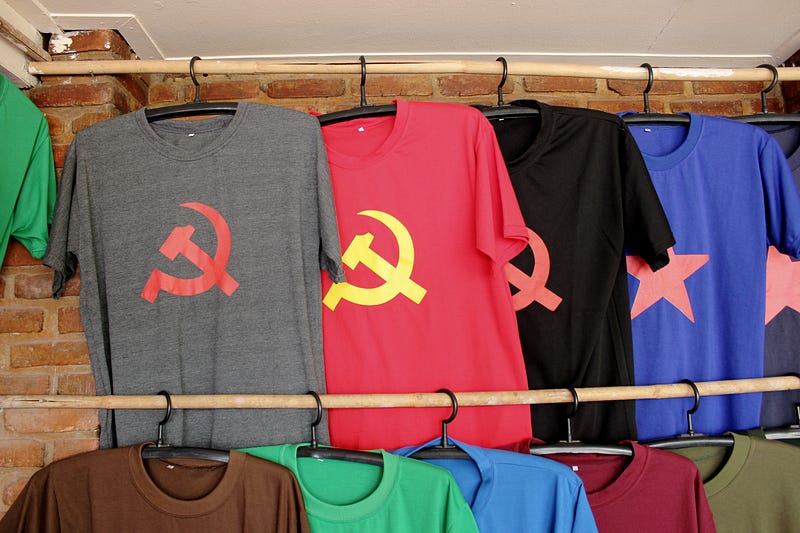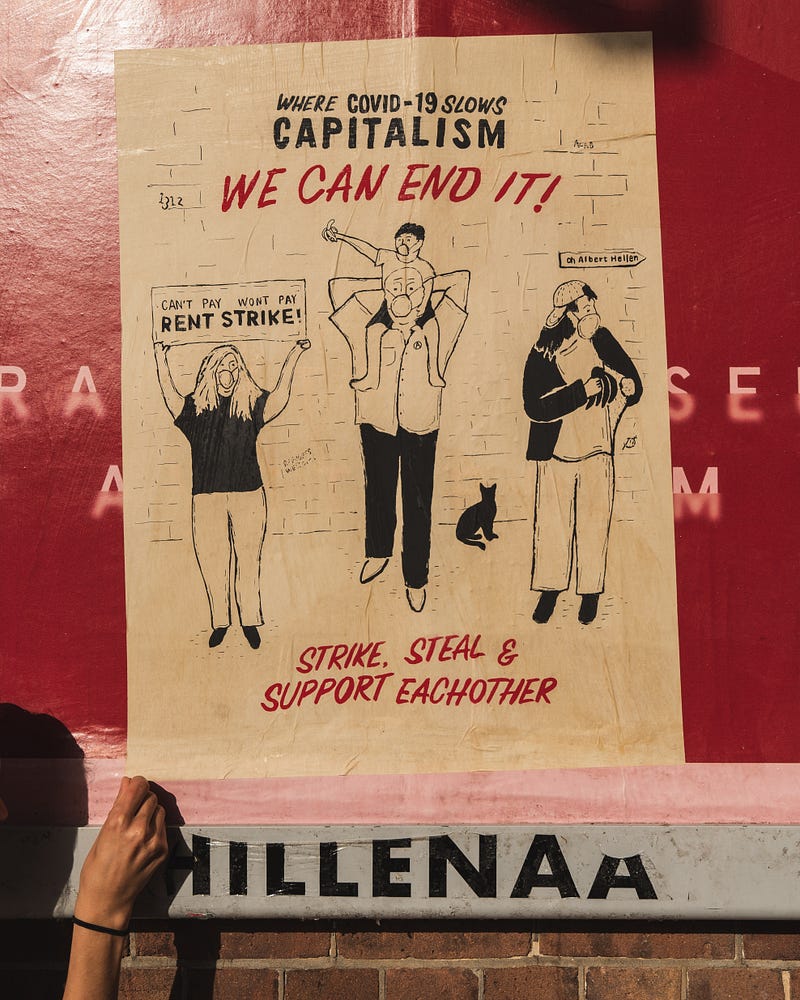Part 2 of a Discussion of Peter Foster’s Why We Bite the Invisible Hand Chapter 3 “Fears of a Clown: The Golden Arch-Enemy”
In the previous blog, Foster showed us how many difficulties McDonald’s faced trying to run a restaurant in Moscow upon making a deal in 1988 when it was still the Soviet Union. At all other locations, McDonalds functioned within a network of vendors motivated by profits, but it would have none of that in Moscow.
Now, we will focus on Foster’s explanation about how the history and culture of the Soviet Union created many challenges for this McDonald’s location.
It all starts with Vladimir Lenin “and his embrace of the anti-capitalist teachings of Karl Marx.” (p. 71)
While Lenin was saying he was a champion of the working man, the proletariat, he himself came from a well-off family. With the chaos of the 1917 Russian Revolution, there were many vying for power. That Lenin emerged victorious is a testament to his ruthlessness. (p. 71)
He was obviously good at gaining power, but he did not know what the revolutionaries should do to make the new form of government work.
Lenin and his fellow revolutionaries had not the slightest clue about the workings of business or the economy. He seemed to think that business was mostly a matter of bookkeeping. Within four years, Soviet production had fallen to a fraction of its pre-revolutionary level. (p. 71)
Like many capitalism critics today, he could see the flaws of the current system and then used that as justification for throwing it out. Yet, he had no understanding of how it worked or why, and thus could not replace it with anything that functioned.
Foster notes that Mikhail Gorbachev was born in the early 1930s during the Stalin-caused famine years designed to quell peasant resistance. (p. 71) Gorbachev will become the leader who presides over the end of the Soviet empire.
Even so, he was a true believer in the system. He knew something was not working but he did not question central planning.
Gorbachev could see nothing worked: that four times as many people were needed to repair trucks as to make them, that televisions with cardboard components sometimes spontaneously exploded, that shortages and low quality were endemic. But the notion that central planning was the problem was beyond his grasp because it was the core of the Communist faith and — more fundamentally — because most humans reflexively believe in the validity and viability of central planning. (p. 72)
And there is the crux of the problem with all anti-capitalists. Central planning sounds like it should work and decentralized market forces sound like they should spin out into chaos.
How could something with no one in charge be better at allocating resources? Some people feel better thinking there is someone smart out there making sure things are working out.
But the truth is centralized planning leads to a “disastrous misallocation of resources,” which is “essentially a definition of Communism.” (p. 72)
In reality, it is the invisible hand of the decentralized market forces that can lead to the optimal outcome as each consumer and producer pursues his own self-interest.
Gorbachev first implemented perestroika, which means restructuring. It only tinkered around the edges of their problems so he then moved on to glasnost, which means openness. It began opening the USSR to democracy which resulted in many of the satellite countries of the Soviet empire splitting off.
It was in this time that McDonald’s sealed the deal in 1988 to open the Moscow restaurant because Gorbachev had begun allowing joint ventures between foreign companies and Soviet organizations. (p. 74)
By February 1990, the Soviet empire was crumbling, one month after the McDonald’s Moscow restaurant opened.
[Gorbachev] effectively ended Communist rule by agreeing to multi-party politics and announcing the end of opposition to private property, the core of the Marxist system. (p. 73)
It was the first time McDonald’s had opened a franchise without an individual owner but instead with an organization, the Moscow city council. It was the only way to move forward in Moscow. (p. 74) Still, there were many problems to solve.
There were no local suppliers for McDonald’s to order from because for 70 years “private property and personal initiative had been crimes.” (p. 74)
McDonald’s brought in some of its largest suppliers from around the world to coach selected Soviet farmers and ranchers. Even with that extraordinary step, McDonald’s was still going to have to build a food complex to create its ingredients.
They brought in a Finnish company with experience with the Soviets to build the 10,000 square meter processing “McComplex.” (p. 75) The leader of that project noted the difficulties of building with the Soviets.
I have never seen a development completed on time. The problem is material flow. You just can’t plan the job, because you never know when, or if, materials will turn up. The system is such that nobody is to blame. Everybody passes the buck. (p. 75)
In the free market, people have an incentive to take responsibility because if they make something work, they win financially. In the Soviet system, taking responsibility could get you killed. And you will not benefit if it goes well so the only incentive is to make sure you cannot be blamed.
Once the restaurant opened, it was well received by the Russian consumers. It was an enormous, multi-level, 700-seat restaurant. (p. 74) In one year it had sold 4 million Big Macs. (p. 78) Yet the success put an even larger strain on the struggling supply chain McDonald’s pieced together.
It was also popular with young job-seekers. Over 25,000 applications were put in for the 630 job openings. A huge perk of being hired was attending their training program in Toronto or Oak Brook, Illinois. (p. 77)
Still, all of this is within an anti-capitalist culture. The Moscow city council which was McDonald’s partner was inclined to take its share of the profits and run.
That was the Soviet way. Everybody grabbed what they could, as soon as they could, on the basis that if they didn’t, somebody else would. Such was the ironic — but inevitable — fruit of a system based on denigrating and countering the “greed” and “selfishness” of capitalism. (p. 79)
You will recognize them by their fruits. The capitalist system incentivizes cooperation and abundance. The communist system incentivizes greed and selfishness.
The venture, and the organization behind it, demonstrated that the Soviet Union had been build upon a demonic vision of capitalism that bore little if any relationship to the reality. (p. 74)
In the next chapter, Foster explores further the darkness in the anti-capitalist movements including Marxism and other utopian movements.
Reference: Foster, Peter, 2014. “Fears of a Clown: The Golden Arch-Enemy” Chapter 3 of Why We Bite the Invisible Hand, Pleasaunce Press.




